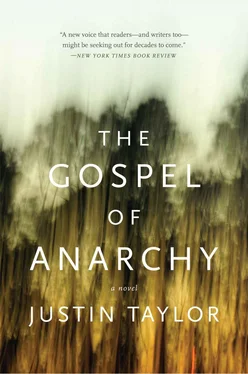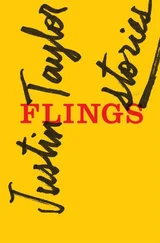When nobody’s paying attention, Liz pokes into the ruin of the scanner and finds the last of the three Polaroids, the close-up, which David apparently never bothered to put back in whatever shoe box with the other two. It’s bent but not torn. She’s got an idea now about what he said the other night. The big confession. What a prick, to have done this to this poor girl, doubtless without her knowing, much less consenting, and after the way she — that is, the girl, not Liz — put herself out there to please him. Men. And yet, doesn’t it sort of put his whole life in a kind of instant perspective for her? For repentance to emerge, a person first must despair with a vengeance… She could pocket the picture, show it to Katy. Or she could keep it to herself, a little ace in the hole in case of — well, she can’t think of an example, but that doesn’t mean there won’t be one. Isn’t that the whole point of in-case-of? But then her fingers pause mid-reach; she feels a stirring, an upswell of something within herself, this difficult and not quite nameable emotion, one that rarely visits her and that she always associates with the way she imagines Katy feels, effortlessly, all the time. The translation by grace of rage into mercy. Is compassion the word?
She leaves the Polaroid where it is.
Now the van’s loaded. They’re pretty much ready to go. Owl, Anchor, and Thomas are in the bus; David and Liz are making one last sweep. She’s looking at the block of knives on his counter. They’re Henckels, which is seriously high-end cutlery. He says it was a housewarming present from his parents, or some aunt. He doesn’t remember now. Anyway, he doesn’t even cook. Liz was going to take them earlier, then didn’t, but is now on the fence again. It’s like, salvaging is very anarchist, but coveting and owning and pack-ratting are not. Point, counterpoint. So what to do?
“I guess I could always swing back by,” she says, meaning if she breaks down in a day or two and wants them after all, maybe as a little self-reward for not swiping the picture. Unless of course she were to come back by for the knives, and end up grabbing both, which is also possible. The thing about compassion is it rots like fruit.
“No,” David says. He doesn’t raise his voice, but there’s a conviction in it that startles her. He’s shaking his head; weird look on his face she can’t read. Or else its sad unreadable muddle is itself the message, plain as day. “Take them now if you want them. I never want to see this place again.”
Oh-kay , Liz thinks, tucking the block up under her arm. He sounds so sure of himself. She wonders how long he’s going to last at their house, before whatever head trip he’s on runs its course. Or he gets tired of Katy, which is what always happens with these thirds they pick up, these men Katy attracts, desperate young men lost at sea in their own too-easy lives, and Katy the captain of the steamer that plucks them from the yachts they take for leaky life rafts. Which makes Liz, what, skipper or something? Or better yet, first mate? A terrible pun, and moreover: not the point. The point is that after all the succor and safe passage, the spirituality and the sexual healing and rocking each other like ocean waves, comes landfall. And when that happens, he goes. Whoever he is, whatever he might have promised to her — to them — in the heat of whatever, is forgotten or denied. He’s healthy now, well rested, ready for the world again. No more need for big ideas about a God who loves you without conditions, or the way we were meant to really live; he’s thinking about getting his old job back, maybe patching things up with Betty Sue. That’s the pattern, and David fits it, though admittedly not as snugly as she’s used to, which is to say, as she would like. His going nuclear on his life like this is something she’s never seen before, and truth be told she actually sort of pities him. He’s drunk on the discovery of how easy it is to drop out of the world. What he doesn’t yet know is how fucking hard it’s going to be to get back in, but that’s because right now he believes he’ll never want to. And there’s no way she could explain it to him, convince him of all this — he’d only think she was trying to get rid of him — so why not make the most of the situation? In a week or a month or whatever, when he realizes the scope of his disaster, he’ll probably want a lot of this shit back. So she’ll return the knives to him, if and when he asks. She promises this to herself, because despite his scuzzy secret, despite herself, really, she’s genuinely growing to like him, which is a lot more than she can say for some of the people Katy’s brought home. And yes, she knows that she, technically, is the one who brought him into the house, her and Thomas, but that’s not what she means at all. His coming into the bedroom, into their lives , was all Katy’s doing, and it’s just a fact that, like God, sometimes Katy works her will through Liz. Ah, Katy, Katy, Katy. Even the name knocks chinks in Liz’s angry armor, so the light shines through. A smile on her face now, a smile David thinks is for him. Well, why not let him? He tries hard enough to please her, after all. Hell, why not kiss him? Right here, amid the ashes of the life he’s immolated — this empty kitchen, that broken glass, and these superior knives — and let this be the seal of their truce, their alliance, in the name of the one who links them, the head of their triangle, the one who isn’t here. This kiss Katy won’t witness is for that very reason the ultimate testament to the depth and perfection of Liz’s devotion. Never am I more yours than when I am apart from you, doing those things of which you will never know.
He tastes good, he holds her right, but still, the only thing making this possible is that in her heart she knows he’s only a ghost. She’s thinking ahead to the days and weeks after his inevitable departure, when Katy will be wounded by the loss, weakened and needful — she so rarely is — and Liz will get to tend to her and the two of them will be in utopia for however long. Until the cycle starts up again. The only person who never gets tired of Katy is Liz.
They’re probably getting back to the house about now, Katy thinks. She’s riding her bike up Northwest Twenty-third Street, to Devil’s Millhopper Geological State Park, which is basically a thick ring of trees around the mouth of a hundred-twenty-foot sinkhole on the edge of town. Or maybe technically the Millhopper is part of the next town, Micanopy, Katy’s not sure, but in any case she thinks of it — the sinkhole — as her favorite place in all of Gainesville, outside of her own house. Her bike is an all-black fixed-gear, brand and model unknown, a good-bye gift from a girl she was lovers with a few years back, Sienna, a butch who worked at the used-bike shop on University and Sixth Street. Where is Sienna now? Katy thinks Providence, maybe. She remembers Sienna saying something about an anarchist bike collective there. Spots on the frame where the black paint’s flaking reveal a buried coat of neon green. Probably the bike was owned by a student, stolen by a crackhead, and sold to the bike shop, who repainted it, then stolen by Sienna and gifted to Katy. Cycle of life, Katy muses, and hey, wouldn’t that be a rad name for a bike shop?
She turns left onto Northwest Eighth Avenue, a pretty steep hill, at least by local standards. If she had a geared bike and/or was in better shape, this could be a twenty-minute ride. As things stand, it’ll take closer to twice that long, but no matter. More time to think is all.
Now she’s riding past the first of the planet sculptures: Pluto. This is really cool; in fact it’s why she chose this route. Some artist got a bunch of public funding to install the sun and all the planets in a “solar walk” down this mile-long stretch of Northwest Eighth, with all the distances between them proportional to the real distances, at a scale of like four billion to one. It’s amazing, the spaces between the back four, compared with how the first six are all packed in. What a strange, mind-blowing thing outer space is. The magnitude, cold waste between clusters of energy; this knowledge that staggers and stuns. Hard to imagine how God’s grace shines over all of it, out from it, how His presence infuses and blesses and sustains every cubic inch, every micrometer, every light year and galaxy and void. The atoms and subatoms that comprise this world, this reality, those planet statues (past Uranus now, approaching Saturn), the road below her, the trees overhead, the bike she’s riding, and — of course — her. Vast black gulfs between stars and planets, between each nucleus and the electrons hurtling in their orbits. It’s not a question of belief — she does believe, with her whole self — but rather one of processing power. She can comprehend these ideas, as ideas, but she can’t see them, can’t envision the fullness, the totality of the thing as the thing itself. What’s that verse in John? She’s passing Mercury, coming up on the sun statue now. The sculptures themselves are not especially impressive, but like so many other things in this world, their value is not in what they are so much as in what they represent, or better — point toward. A not grand thing may yet be a quite grand sign. Is this why God took the shape of a man? She imagines Jesus Christ, a blazing chalk outline mapped over a galaxy, ours, complete with connect-the-dots constellations. See Him drifting through the dippers, past Orion. Her Christ is not the crucified, but the resurrected Son of Man. He who lived and Lives and, Living, delivers life and life everlasting, in the form of those glimpses of the eternal that rupture our individuality, our confinement in time. He is the archetype in triumph, a man-shaped hole in existence, the eye of the needle of the world.
Читать дальше












